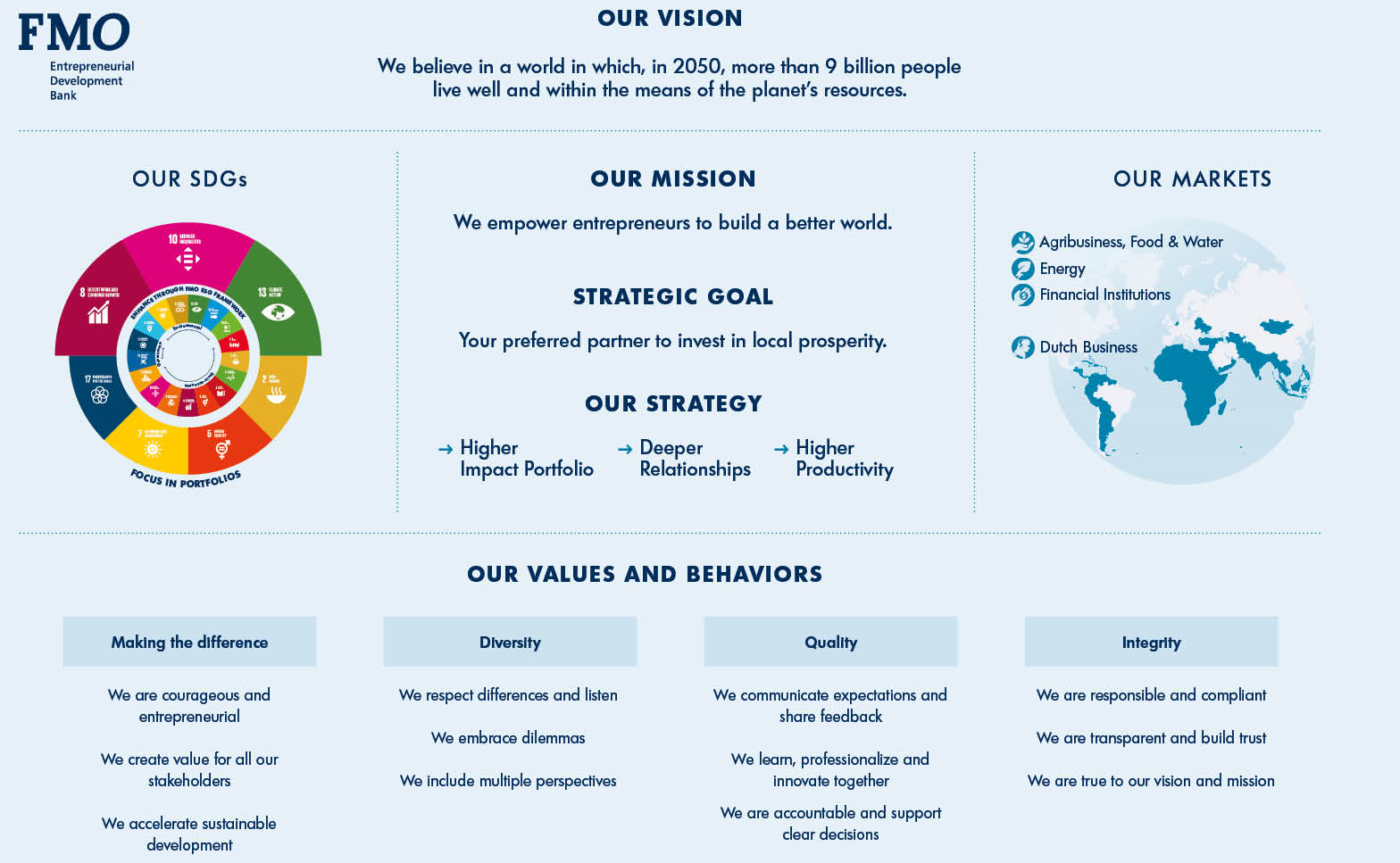Our strategy

We believe in a world in which, in 2050, more than 9 billion people live well and within the means of the planet’s resources. To achieve this, we need to overcome the global challenges as highlighted by the 17 SDGs. FMO aims to contribute to their solution by focusing on the following core SDGs:
Decent Work and Economic Growth (SDG 8)
Reduced Inequalities (SDG 10)
Climate Action (SDG 13)
Through sector-specific initiatives we further contribute to Zero Hunger (SDG 2), Gender Equality (SDG 5), Affordable and Clean Energy (SDG 7) and Partnerships for the Goals (SDG 17).
FMO’s ultimate strategic goal is to become the preferred partner to invest in local prosperity. We focus our efforts on three strategic objectives: higher impact portfolio, deeper relationships and higher productivity.
Higher Impact Portfolio
By reaching out to underserved markets, we invest in some of the world’s most challenging business environments. The countries that we work in often have a fragile private sector, little job security and high poverty rates. As a development bank, FMO is expected to make a meaningful contribution towards opening up new markets, creating opportunities, and lowering thresholds for other financiers. FMO focuses on sectors and regions where we can have impact and we team up with others to achieve impact at scale.
Our strategic focus is on markets in Africa, Asia and the European Neighborhood1. By creating or supporting jobs and strengthening local economies, we contribute to stability in these underprivileged regions.
Our focus sectors are Financial Institutions, Energy and Agribusiness, and Food & Water. Investments in financial institutions aim to increase financial inclusion for Micro, Small and Medium Enterprises (MSME) and enable them to be agents of change in for instance green and inclusive finance. We will expand our current Venture Capital program, focused on pioneering technologies in our three core sectors, and find opportunities to reach out to the underserved and thereby reduce inequalities. In Agribusiness we add value to the entire supply chain from (innovations in) fertilizers and seeds to smallholder farmers and food processors, traders and companies. As such, we help to improve access to quality food. Through energy investments, we power economies and communities and promote the transition to a low-carbon system.
We aim to increase our share of investments in the total portfolio labeled ‘green’ and/or ‘reducing inequalities’ and to develop activities that will help keep global warming below 1.5 degrees. For instance, we do this by increasing efforts in forestry and soil management, supporting the adoption of renewable energy programs or initiatives in frontier markets, and by contributing to energy access and security in least developed countries. We also actively engage with our clients to increase their environmental and social standards in line with the IFC Performance Standards, including respect for human rights. This has a positive impact on local communities.
In partnership with European Development Finance Institutions (EDFI) we have begun to build an international coalition to harmonize impact management. Our focus is on gender equality (SDG 5), economic growth (SDG 8), reducing inequalities (SDG 10), climate action (SDG 13) and partnerships for the goals (SDG 17). Our first step has been to harmonize on jobs and avoided GHG emissions and the new methodology will replace our current one for measuring our 2020 Doubling and Halving ambition.
Deeper Relationships
We feel strongly about deepening relationships with our stakeholders, because by pooling resources and partnering with others we can significantly increase our impact. As part of efforts to deepen relationships, FMO mobilizes and blends funds, builds partnerships, manages funds on behalf of the Dutch government, supports Dutch businesses and builds employee and client relations.
One of our priorities is to engage commercial investors to co-invest alongside ourselves, both through fund management and syndicated transactions. We will optimize our blending strategy and develop new mobilizing vehicles to increase leverage of FMO’s own investments. This increases funding to emerging markets.
We will strengthen relationships with our clients by creating additional value in the area of human capital, leadership and project development. This includes increasing capacity development to support innovative programs around green and gender and improving client service through optimizing processes and opening offices in Nairobi and Singapore. In addition, the NL Business department will ramp up its project development activities through the Development Accelerator Fund and step up efforts to develop partnerships to support Dutch business activities in emerging markets. Furthermore, we aim to increase the share of direct equity, platform investments and co-investments in our private equity portfolio.
Higher Productivity
We will continue to build a high performing organization that enables us to deliver high impact and build deeper relationships in a more efficient and productive way.
To this end, we will improve customer service, quality of data and increase productivity, for example by improving our Know Your Customer (KYC) renewal process and optimizing our investment, portfolio and fund management processes. We will further automate our product administration to reduce manual work, reduce operational risk and to support the implementation of commercial initiatives. We will enhance our impact management capability and improve impact measurement and reporting in line with investor and stakeholder expectations.
In addition, we will seek more effective collaboration within and across teams to increase deal production. Where possible we will create a consortium with partner organizations to capture synergies.
- 1 The European Neighborhood comprises Algeria, Armenia, Azerbaijan, Belarus, Egypt, Georgia, Jordan, Lebanon, Libya, Moldova (the Republic of), Morocco, Syrian Arab Republic, Tunisia, Turkey, and Ukraine